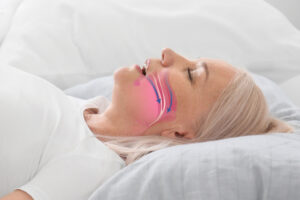The term sleep disorders refers to conditions that affect the quality, timing, and duration of sleep, which in turn affects the ability to function properly while awake. Sleep disorders can initiate or escalate other health problems, and they can also be symptoms of underlying mental health conditions. Nearly 100 sleep disorders have been identified, and an estimated 50 to 70 million American adults suffer from one or more. Here’s a list of 7 of the most common sleep disorders.
1. Insomnia
One of the most common sleep disorders is insomnia. This sleep disorder is the inability to fall asleep or remain asleep until morning. If you struggle with insomnia, you may experience daytime sleepiness and have difficulty functioning while awake. When these symptoms occur at least three times a week for at least three months, you may be diagnosed with chronic insomnia. Insomnia is more common in older adults, those in lower socioeconomic status, and those with depression or anxiety.
2. Sleep Apnea

3. Narcolepsy
One of the sleep disorders that can affect you outside of bedtime is narcolepsy. Individuals with narcolepsy feel excessively tired during waking hours, even after getting enough sleep the night before. This can cause “sleep attacks,” which are an irrepressible urge to sleep. Narcolepsy is caused by disruptions in the brain’s ability to manage the sleep-wake cycle. If you have narcolepsy, you are at a high risk of accident or injury, but medications and lifestyle changes can help.
4. Restless Legs Syndrome

5. Parasomnias
Parasomnias are sleep disorders that cause unusual behaviors before or during sleep or while transitioning between wakefulness and sleep. Children are most commonly affected by parasomnias, but adults can also experience them. Parasomnias include sleepwalking, night terrors, bedwetting, sleep paralysis, exploding head syndrome, and other unique experiences. These sleep disorders are categorized by when in your sleep cycle they occur.
6. Hypersomnia (Excessive Daytime Sleepiness)

7. Non-24-Hour Sleep-Wake Disorder
Your circadian rhythm is what guides your sleep-wake cycle. For most people, this cycle resets approximately every 24 hours, causing them to get sleepy around the same time each night. If you have non-24-hour sleep-wake disorder, your circadian rhythm may be longer or shorter than 24 hours. This can cause your sleep and wake time to shift an hour or two later or earlier each day. This sleep disorder most commonly affects people who are blind and unable to see light.
Tips for More Restful Sleep
Whether you have one of these sleep disorders or just have trouble sleeping on occasion, it can be difficult to function and feel good after a night of poor sleep. Inadequate sleep can lead to a number of health issues, so it’s important to do what you can to get a good night’s sleep. Check out these tips for restful sleep that may help improve the way you sleep at night.
